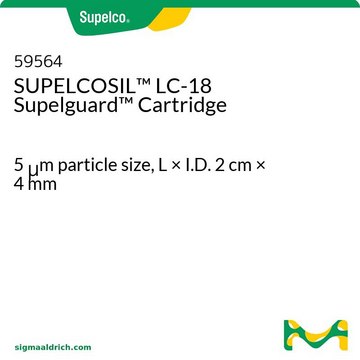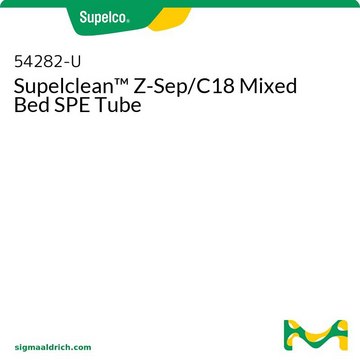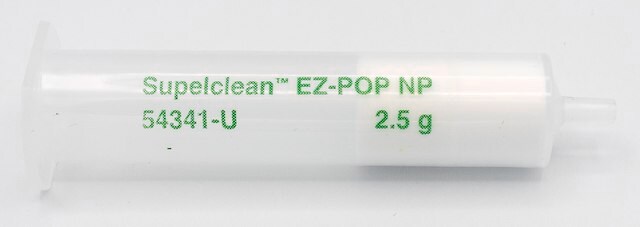Kluczowe dokumenty
55491-U
Supel™ QuE QuEChERS tube
Z-Sep Tube, pk of 50, centrifuge tube volume 15 mL , Shaker Compatible
Synonim(y):
QuEChERS
About This Item
Polecane produkty
Nazwa produktu
Supel™ QuE, Z-Sep Tube, pk of 50, centrifuge tube volume 15 mL , Shaker Compatible
Materiały
polypropylene tube
Poziom jakości
linia produktu
Supel™
skład
Z-Sep, 500 mg
opakowanie
pk of 50
metody
QuEChERS: suitable
pojemność probówki reakcyjnej (do wirowania)
15 mL , Shaker Compatible
grupa aktywna macierzy
zirconia-based phase
Zastosowanie
food and beverages
Szukasz podobnych produktów? Odwiedź Przewodnik dotyczący porównywania produktów
Opis ogólny
Using the QuEChERS method, food/agricultural samples are first extracted with an aqueous miscible solvent (e.g., acetonitrile) in the presence of high amounts of salts (e.g., sodium chloride and magnesium sulfate) and/or buffering agents (e.g. citrate) to induce liquid phase separation and stabilize acid and base labile pesticides, respectively. Upon shaking and centrifugation, an aliquot of the organic phase is subjected to further cleanup using SPE. Unlike traditional methods using SPE tubes, in dispersive SPE, cleanup is facilitated by mixing bulk amounts of SPE (e.g., Supelclean PSA, ENVI-Carb, and/or Discovery DSC-18) with the extract. After sample cleanup, the mixture is centrifuged and the resulting supernatant can either be analyzed directly or can be subjected to minor further treatment before analysis.
Supelco carries a line of vials and centrifuge tubes containing pre-determined amounts of salts and SPE sorbents to support the most common method configurations used today.
Kompatybilność
Inne uwagi
Z-Sep+ is recommended for cleanup of samples containing greater than 15% fat.
Z-Sep/C18 is recommended for cleanup of samples containing less than 15% fat.
Z-Sep is recommended for cleanup of samples prior to analysis of hydrophobic analytes.
Informacje prawne
Nie możesz znaleźć właściwego produktu?
Wypróbuj nasz Narzędzie selektora produktów.
Kod klasy składowania
11 - Combustible Solids
Klasa zagrożenia wodnego (WGK)
WGK 3
Temperatura zapłonu (°F)
Not applicable
Temperatura zapłonu (°C)
Not applicable
Wybierz jedną z najnowszych wersji:
Masz już ten produkt?
Dokumenty związane z niedawno zakupionymi produktami zostały zamieszczone w Bibliotece dokumentów.
Klienci oglądali również te produkty
Powiązane treści
QuEChERS is a ‘Quick, Easy, Cheap, Effective, Rugged and Safe’ sample cleanup method used to prepare food and agricultural samples for pesticides analysis. QuEChERS is based on the Solid Phase Extraction (SPE) technique of sample preparation.
Metoda QuEChERS upraszcza oczyszczanie próbek do analizy pestycydów w próbkach żywności i rolniczych.
Metoda QuEChERS upraszcza oczyszczanie próbek do analizy pestycydów w próbkach żywności i rolniczych.
QuEChERS method simplifies sample cleanup for pesticides analysis in food and agricultural samples.
Nasz zespół naukowców ma doświadczenie we wszystkich obszarach badań, w tym w naukach przyrodniczych, materiałoznawstwie, syntezie chemicznej, chromatografii, analityce i wielu innych dziedzinach.
Skontaktuj się z zespołem ds. pomocy technicznej





